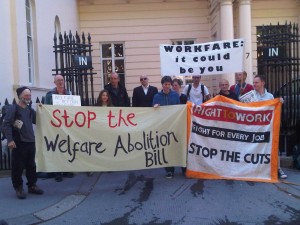Submitted by Mark Barrett. This work was previously published on RightToWork.org
 Image credit www.whiteflag.info
Image credit www.whiteflag.info
In the spirit of a Popular Assembly, the Right to Work Campaign have kindly offered me the opportunity to blog about the Spanish Real Democracy Movement. As part of this, I would like to put forward a personal view on the future of work in a really democratic society. Hopefully this will stimulate some debate!
In an advanced society liberating, enjoyable and well-rewarded work should be available to everyone. Under neo-liberalism however, workers get caught between an unstable, precarious (and often unfulfilling) job market on the one hand, and the dole queue on the other. With a third ‘option’ the capitalist sop, a coercive form of employment known in the UK as workfare.
I argued in 2009, as I do now that after the real democracy revolution there will be an enormous liberation in the world of work from the present model. The big clue as to how it will look can be found in the 15M movement’s organisational model, Popular Assemblies. In Spain these are now taking root at the neighbourhood level and I think this illustrates how, in its decision-making the 15M movement embraces the ideal of a decentralised democratic constitution. This is important because ‘real democracy’ – the inclusion of everyone in political-economic decision-making as equals, the politics of the common - can surely only come about when we recalibrate social organisation to the local, human-scale, community base.
 It follows from this that work life in a really democratic society will follow a similar pattern. In a democratic society, because sovereignty, including the power of public service employment will vest, not with Parliament but with the people, it is the local level that will hold real political power – albeit in concert with all the other local levels and with clear lines of delegation and communication going ‘up’ to the regional / city-wide, national and international levels and back ‘down’ again. And from this fact, the productive capacity of democratic employment will be reflected.
It follows from this that work life in a really democratic society will follow a similar pattern. In a democratic society, because sovereignty, including the power of public service employment will vest, not with Parliament but with the people, it is the local level that will hold real political power – albeit in concert with all the other local levels and with clear lines of delegation and communication going ‘up’ to the regional / city-wide, national and international levels and back ‘down’ again. And from this fact, the productive capacity of democratic employment will be reflected.
In a really democratic system public money cannot be misused as is the case under the present state-welfare model. Instead, accountable, transparent sovereign communities will employ people, as they see fit via consensus decision-making to produce whatever things the individual concerned AND the community in question agree need producing. Employment will probably still be available in a (transformed) job market, but alongside this there will also be the option, via local assembly sovereignty of gainful ecological, soulful, dignified employment in a community of each worker’s choice. And because each sovereign empowered local community will now produce its own unique culture (rather than the homogenisation of townships we see presently) everyone will have a huge choice of work options, with different priorities in each diverse community. No longer should anyone feel forced to labour in an alienated way. I wrote in 2010:
“Unemployed people would thereby freely contribute to a new, flourishing local culture while also helping themselves; perhaps by starting setting up a new business, or helping run the neighbourhood crèche, or planting fruit trees along the local street, or putting a colourful mural on a concrete wall. This reform would spell an end to economic inactivity for ‘claimants’, building self reliance through community support, but without coercion. Communities would compete with each other for labour, by offering different opportunities and a positive cultural outlook…”
In short work will make you free, after all! And, siestas may be included! But these are just some activists’ viewpoints – what are yours??
Addenda: ‘Real Democracy Now’ as a slogan might seem to have come out of the blue, but in reality, like the Assemblies that drive them it’s been in the ether for some time. In the Seattle anti-globalisation protests of 1998 for example, chants of “this is what democracy looks like” outside the WTO were inspiring. Preceding that, the slogan “Democracia, Tierra y Liberdad!” were central to the Zapatistan and also later Oaxacan movements which inspire so many to this day. In the UK, following two years defending the right to protest in Parliament Square with the weekly People in Common picnic, some of us got together to consider the true democracy ideal, developing a project for a 21st Century Constitution in the UK. From this, we promoted People’s Assemblies as the means to achieve it. Later, some of us set up (uncannily same-named) ‘Campaign for Real Democracy’ UK (CRD) network – which just goes to show you can’t stop an idea. We included in our 2009 CRD discussions the impact of real democracy on the future of work. And it is from these discussions that the above ideal was born. Comments please !
Theme by Danetsoft and Danang Probo Sayekti inspired by Maksimer